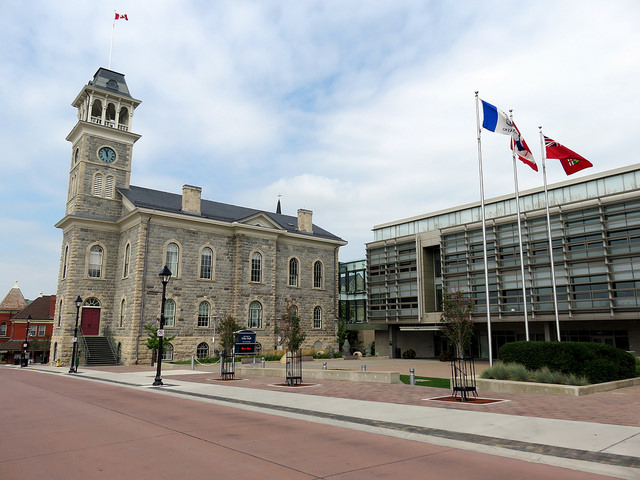rabble is expanding our Parliamentary Bureau and we need your help! Support us on Patreon today!
Last week, I sat in the historic chambers of Cambridge’s old city hall with about a half dozen contributors to the Waterloo region living wage committee to see if that city would become Ontario’s first living wage municipality.
Old city hall, which opened in 1858 to service the fine people of what was then known as Galt, has since been rejuvenated and serves as council chambers for today’s elected officials.
The door to the historic site tells you something about the stately expectations of old city hall: it was about a foot taller than I — at 5’9, I am no slouch — and twice the acceptable width of most doors today.
Once inside that stately door, we listened to eight councillors discuss Item 10, a recommendation “that the City of Cambridge becomes a Living Wage employer at the Supporter Level immediately.”
By way of background, Living Wage Waterloo Region set up a formal regional living wage employer recognition program a year ago and has since signed up 20 living wage employers at one of five levels: friend, supporter, partner, leader and champion.
The friend designation is the ground-floor entry for any private or public sector employer wishing to lend support to that region’s burgeoning living wage movement. This level says an employer is committed to begin the process of raising full-time employees to a living wage within a year.
The next step, supporter level, acknowledges an employer who already pays its full-time employees at least a living wage and commits to begin raising all part-time employees to a living wage within a year.
A briefing note prepared by city staff revealed that the City of Cambridge already pays its 565 permanent, full-time staff at least the local living wage, which is $16.05 an hour.
So, victory! And important to recognize. But to make full supporter level in Waterloo region, the city needed to commit to a plan to raise part-time workers to living wage status, too.
Who would that cover? Temporary, casual or seasonal workers. The city report says 70 per cent of its part-time, casual and temporary workers are students.
The focus, then, would be on building a bridge for that 30 per cent of adult part-timers who work for the city to lift them to a living wage.
They might be crossing guards (60 of them). They might be non-unionized part-time/casual workers (220 of them). They might be the two CUPE Local 1882 employees (two of them).
This doesn’t include, at this early stage in the city’s living wage initiative, those workers the city contracts out to: they might be custodial workers — the part-timers make the minimum wage of $11.25 an hour. They might be building cleaners — they make $11.50 an hour. They might be security — they make $12.25 an hour.
The city report notes “there are hundreds of projects that require contracted services.”
In order for the City of Cambridge to move up to level three, partner status, it would be paying all full-time and part-time employees at least a living wage and then commit to begin raising the pay of student positions or contracted employees to a living wage within a year.
Next step, perhaps.
Meanwhile, it was heartwarming to listen to the majority of Cambridge city councillors overwhelmingly support the motion to become a living wage at the supporter level, for all the right reasons:
“All workers deserve and should be entitled to a decent standard of living,” said one councillor.
“That money is spent in our community.”
“I’m proud that Cambridge will be a leader in the province.”
“It’s about leadership. It is about a sense of community. It’s something we can do for our community.”
“We want our community to know that we believe in the living wage.”
There is only one other living wage municipality in Canada at the moment — New Westminister, B.C.
But the City of Vancouver’s mayor has committed to make that city a living wage employer.
The City of Toronto just passed a motion to “champion a living wage standard across Ontario” and to “give preference to vendors providing goods and services to the city who pay a living wage.”
And the City of Hamilton is examining the issue.
Slowly, but surely, municipalities are beginning to awaken to the power they have as anchor institutions in their own community. The living wage is a tool that can be used to exercise that muscle.
Last week, in historic downtown Cambridge, city council made history in Ontario by opening the door to a higher standard for lower-paying work in that community. It will make a real difference in real people’s lives.
Trish Hennessy is director of the Canadian Centre for Policy Alternatives’ Ontario office. Follow her on Twitter @trishhennessy and follow CCPA-Ontario @CCPA_Ont.
Photo: Sean_Marshall/flickr
rabble is expanding our Parliamentary Bureau and we need your help! Support us on Patreon today!




